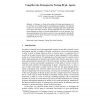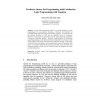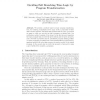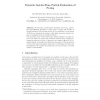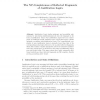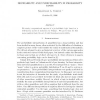131
Voted
LOPSTR
2009
Springer
15 years 9 months ago
2009
Springer
In this work, we first consider a goal-oriented extension of the dependency pair framework for proving termination w.r.t. a given set of initial terms. Then, we introduce a new re...
127
click to vote
LOPSTR
2009
Springer
15 years 9 months ago
2009
Springer
We show how to combine the two most powerful approaches for automated termination analysis of logic programs (LPs): the direct approach which operates directly on LPs and the trans...
137
click to vote
LOPSTR
2009
Springer
15 years 9 months ago
2009
Springer
Abstract. In this paper we focus on the problem of testing agent programs written in BUpL, an executable, high-level modelling agent language. Our approach consists of two main ste...
114
click to vote
LOPSTR
2009
Springer
15 years 9 months ago
2009
Springer
We propose a new grouping operator for logic programs based on the group_by operator of SQL. The novelty of our proposal lies in the use of modes, which allows us to relax some rat...
193
click to vote
LOPSTR
2009
Springer
15 years 9 months ago
2009
Springer
Answer Set Programming (ASP) is a powerful paradigm of logic programming for non-monotonic reasoning. However, the restriction of “grounded range-restricted function-free normal ...
133
click to vote
LOPSTR
2009
Springer
15 years 9 months ago
2009
Springer
Abstract. We present a method based on logic program transformation, for verifying Computation Tree Logic (CTL∗ ) properties of finite state reactive systems. The finite state ...
104
click to vote
LOPSTR
2009
Springer
15 years 9 months ago
2009
Springer
Abstract. We introduce a just-in-time specializer for Prolog. Just-intime specialization attempts to unify of the concepts and benefits of partial evaluation (PE) and just-in-time...
130
Voted
LFCS
2009
Springer
15 years 9 months ago
2009
Springer
In this paper we consider languages of labelled N-free posets over countable and scattered linear orderings. We prove that a language of such posets is series-rational if and only ...
154
Voted
LFCS
2009
Springer
15 years 9 months ago
2009
Springer
We study computational aspects of a probabilistic logic based on a well-known model of induction by Valiant. We prove that for this paraconsistent logic the set of valid formulas ...

